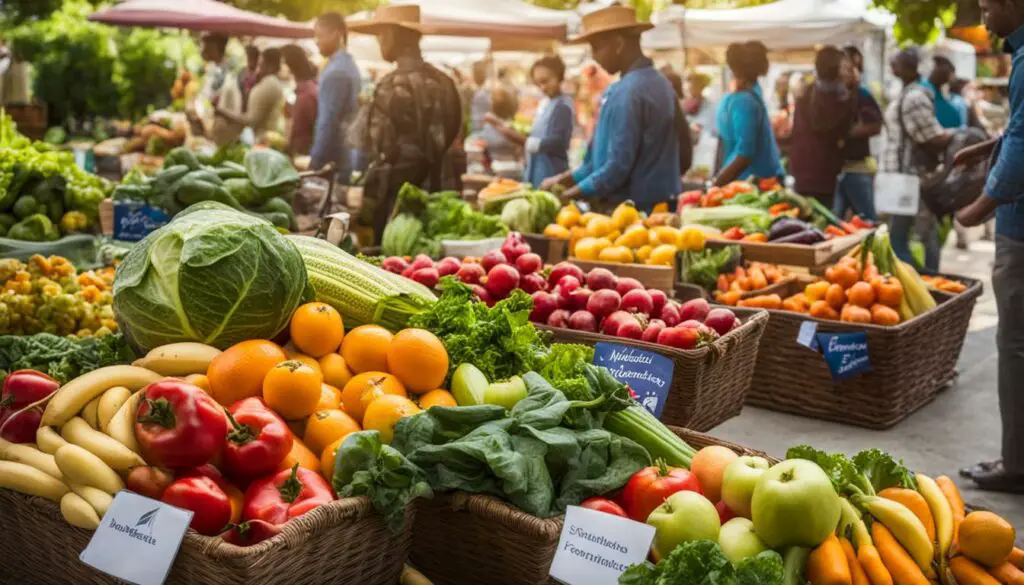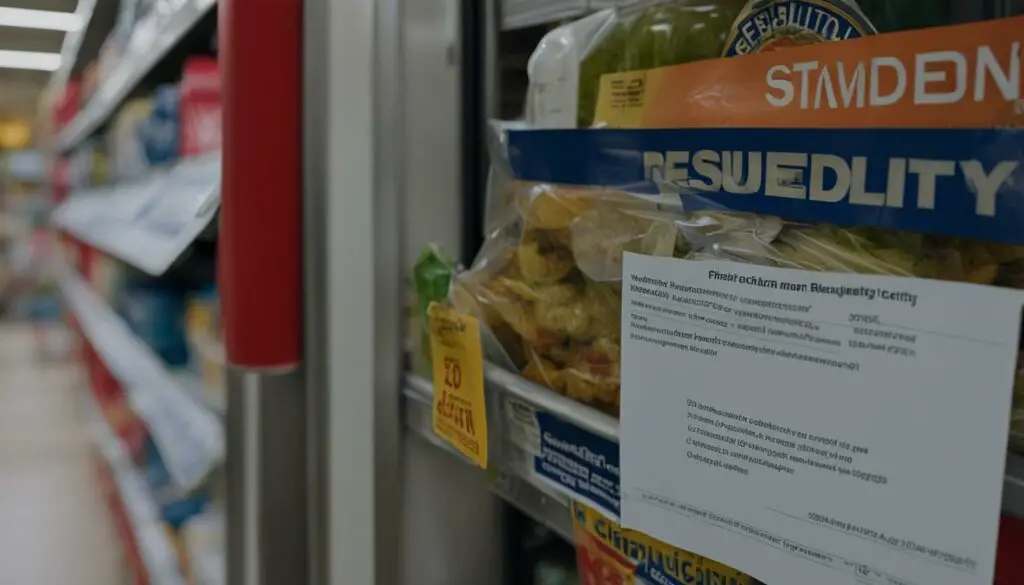Originally posted on December 13, 2023 @ 8:10 pm
Are you wondering if you can get food stamps without a job? You may be surprised to learn that it is indeed possible to qualify for food stamps, also known as SNAP benefits, even if you are currently unemployed. Eligibility for food stamps depends on several factors, including household size and income.
In states like California, household size includes anyone you live and buy/make food with. When it comes to income, both earned and unearned income are taken into consideration. It’s important to note that you can still be eligible for food stamps as long as you are not intentionally leaving a job just to qualify.
Non-citizens with qualified alien immigration status are also eligible to receive SNAP benefits. Age, student status, and homelessness do not necessarily disqualify you from receiving food stamps. To determine your eligibility, it is best to start the application process.
Table of Contents
Key Takeaways:
- Eligibility for food stamps without a job is possible if you meet the income and other criteria set by your state.
- Household size and income, both earned and unearned, are factors considered in determining eligibility.
- Non-citizens with qualified alien immigration status are eligible for SNAP benefits.
- Age, student status, and homelessness do not automatically disqualify you from receiving food stamps.
- Start the application process to determine your eligibility for food stamps.
Income Limits and Application Process

When considering eligibility for food stamps, it’s essential to understand the income limits associated with the program. These limits can vary depending on the state you reside in and the size of your household.
To determine your specific income eligibility, it is highly recommended to start the application process. Through the application, you will provide information about your household size, income, and any other relevant circumstances that may impact your eligibility.
Gathering all the necessary documents and information before applying will help expedite the process and ensure accurate determination of your eligibility. This may include proof of income, identification documents, and verification of household size.
Applying for food stamps can be done in multiple ways. You can visit your local office in person or call the state Supplemental Nutrition Assistance Program (SNAP) hotline for guidance on the application process. The staff will provide you with the necessary forms to complete and guide you through the application requirements.
During the application process, you will need to provide detailed information about your household size, income, and any additional circumstances that could affect your eligibility. It’s important to be thorough and accurate when filling out the application to ensure proper consideration.
Once your application is submitted, it will be reviewed by the appropriate authorities to determine your eligibility for food stamps. The review process may take some time, so it’s essential to be patient and follow up if necessary.
Overall, the income limits and application process for food stamps play a crucial role in determining if you are eligible for government assistance for food. Starting the application process and providing all the necessary information will help expedite the review and ensure you receive the support you need.
| State | Household Size | Maximum Monthly Income Limit |
|---|---|---|
| California | 1 | $1,383 |
| California | 2 | $1,868 |
| Texas | 1 | $1,354 |
| Texas | 2 | $1,832 |
| Florida | 1 | $1,383 |
| Florida | 2 | $1,868 |
Eligibility for Non-Citizens and Students

Food stamp eligibility extends to non-citizens with qualified alien immigration status, including refugees and victims of trafficking. This means that if you have the appropriate immigration status, you may qualify for SNAP benefits. It’s important to provide documentation and verification of your immigration status during the application process.
Students may also be eligible for food stamps under certain circumstances. If you are a student, you may qualify for SNAP benefits if you meet specific criteria. These criteria include being enrolled less than half-time, being employed at least 20 hours per week, receiving federal or state work-study financial aid, receiving cash assistance, or being enrolled in a program that doesn’t require a high school diploma.
Please note that each state may have additional exceptions or guidelines for student eligibility. To get more information about your specific situation, it’s recommended to contact the state SNAP hotline for further guidance.
| Eligibility Eligibility | Non-Citizens | Students |
|---|---|---|
| Qualified Alien Immigration Status | ✔️ | N/A |
| Enrolled Less Than Half-Time | N/A | ✔️ |
| Employed at least 20 hours/week | N/A | ✔️ |
| Receiving Federal or State Work-Study Aid | N/A | ✔️ |
| Receiving Cash Assistance | N/A | ✔️ |
| Enrolled in a Program That Doesn’t Require a High School Diploma | N/A | ✔️ |
Homeless Individuals and Families

Homeless individuals and families can still apply for food stamps, even if they do not have a permanent address or housing. Living in a shelter or receiving free meals from a shelter does not disqualify you from receiving food stamps. It is important to note that while homeless, you can also use your food stamps at some participating restaurants. To apply for food stamps as a homeless individual or family, you can visit your local office or call the state SNAP hotline for guidance.
| Eligibility Guidelines | Requirements | Benefits |
|---|---|---|
| Homeless individuals and families | Apply for food stamps at local office or state SNAP hotline | Access to food assistance programs and use food stamps at participating restaurants |
Benefits for Pregnant Women and New Parents

Pregnant women and new parents can access various benefits and assistance programs to ensure their nutritional needs are met. Specifically, the Women, Infants, and Children (WIC) program offers essential support to pregnant women, new parents, and children up to 5 years old. Through this program, eligible individuals can receive food and resources that promote healthy growth and development.
During pregnancy, applying for WIC benefits is highly encouraged. These benefits assist pregnant women in obtaining necessary nutritious food and essential resources. By enrolling in WIC, pregnant women can access items such as fruits, vegetables, whole grains, dairy products, and more. WIC benefits not only help maintain maternal health but also contribute to the healthy development of the unborn child.
WIC benefits provide pregnant women and new parents with the necessary nutrition to support healthy growth and development.
After childbirth, the household size increases due to the addition of the new family member. As a result, new parents may be eligible for increased food stamp benefits. This ensures that the growing family has access to an adequate food supply during this critical period of transition.
Applying for food stamp benefits during pregnancy and considering other available resources can provide additional assistance to pregnant women and new parents. These programs are designed to support families in accessing nutritious food, promoting the well-being of both parents and children.
Resources for Expectant and New Parents
Aside from WIC benefits and food stamp programs, there are various resources available for expectant and new parents:
- Parenting classes
- Support groups
- Community centers
- Childcare assistance programs
- Healthcare services for mothers and infants
- Child development programs and early intervention services
These resources aim to provide a supportive environment for parents, equipping them with the knowledge and tools needed to raise healthy and thriving children.
The Application Process
To access these benefits and assistance programs, individuals can start by contacting their local WIC office or the state SNAP hotline. These resources can provide the necessary guidance and information on how to initiate the application process.
When applying, it is important to gather all required documentation and information. This typically includes proof of income, identification documents, and proof of pregnancy or birth. Meeting these requirements will help streamline the application process and expedite the approval of benefits.
| Required Documents | Examples |
|---|---|
| Proof of income | Payslips, tax returns, or government assistance documentation |
| Identification documents | Driver’s license, birth certificate, or social security card |
| Proof of pregnancy or birth | Medical records, hospital discharge paperwork, or birth certificates |
By providing all the necessary information and undergoing the application process, pregnant women and new parents can access vital benefits and resources that support their nutritional and overall well-being.
General Work Requirements for SNAP

The Supplemental Nutrition Assistance Program (SNAP) provides crucial support to individuals and families who may be unemployed or facing challenging financial circumstances. To qualify for SNAP benefits, individuals must meet certain general work requirements. These requirements ensure that individuals are actively seeking employment and taking steps towards self-sufficiency.
Here are the general work requirements for SNAP:
- Registering for work: Individuals must register for work with the state employment agency, which includes providing personal information and employment history.
- Participating in SNAP Employment and Training or workfare: Individuals who are assigned to SNAP Employment and Training or workfare programs must actively participate in these programs as a condition of receiving benefits.
- Accepting suitable job offers: Individuals must accept suitable job offers that align with their skills, qualifications, and capabilities.
- Not voluntarily quitting a job or reducing work hours without a good reason: Individuals must maintain their employment and not quit their job or reduce their work hours without a valid reason, such as unsafe working conditions or a significant reduction in wages.
It’s important to note that there are exemptions to these general work requirements. Exemptions include:
- Individuals who are already working at least 30 hours per week.
- Individuals who are meeting work requirements for another program, such as Temporary Assistance for Needy Families (TANF).
- Individuals who are responsible for the care of a young child or an incapacitated person.
- Individuals who are unable to work due to a physical or mental limitation.
- Individuals who are participating in substance abuse treatment.
- Individuals who are enrolled in school or training programs that are approved by the state.
By complying with these general work requirements, individuals can continue to receive SNAP benefits and work towards improving their financial situation. It’s essential to understand and meet these requirements to ensure ongoing eligibility and access to the much-needed assistance provided by SNAP.
Able-Bodied Adult Without Dependents (ABAWD) Work Requirement

To continue receiving SNAP benefits for more than three months in a three-year period, able-bodied adults without dependents (ABAWDs) between the ages of 18-50 must meet additional work requirements in addition to the general work requirements.
ABAWDs have three ways to fulfill the work requirement:
- Working at least 80 hours per month
- Participating in a work program
- Combination of work and work program hours
It is important to note that there are exemptions to the work requirement for certain individuals:
- Those who are unable to work due to physical or mental limitations
- Pregnant individuals
- Individuals with someone under 18 in their SNAP household
- Meeting other general work requirement exemptions
These exemptions recognize unique circumstances that may prevent individuals from fulfilling the work requirement. Remember to consult the specific guidelines and requirements of your state to determine your eligibility.
Residence and Non-citizen Eligibility

To be eligible for SNAP benefits, you must be residing in the state where you are applying for assistance. Non-citizens with qualified alien immigration status, such as refugees or victims of trafficking, are eligible for food stamps. It is important to provide documentation and verification of your immigration status during the application process. Additionally, the state SNAP agency may have specific guidelines and rules regarding eligibility for non-citizens.
| Residence and Non-citizen Eligibility | Summary |
|---|---|
| Residence Requirement | You must be residing in the state where you are applying for SNAP benefits. |
| Qualified Alien Status | Non-citizens with qualified alien immigration status are eligible for food stamps. |
| Documentation | Providing documentation and verification of immigration status is important during the application process. |
| State Guidelines | Each state may have specific guidelines and rules regarding eligibility for non-citizens. |
Income and Resource Maximums
When determining eligibility for food stamps, there are specific income and resource maximums that must be considered. These limits are based on factors such as household size, income, and other circumstances. To know if you meet the income and resource criteria for food stamp eligibility, it’s essential to consult the guidelines and requirements of your state. The state SNAP hotline or local office can provide you with further information regarding the income limits and resource maximums.
It is important to note that these limits vary from state to state. Each state has its own set of regulations to determine the income and resource thresholds for food stamp eligibility. By understanding these limits, you can determine if you qualify for SNAP benefits.
Below is a table that provides an example of income limits based on household size for a specific state:
| Household Size | Maximum Gross Monthly Income |
|---|---|
| 1 | $1,468 |
| 2 | $1,983 |
| 3 | $2,498 |
| 4 | $3,013 |
| 5 | $3,528 |
Remember, this table is just an example, and the actual income limits may differ depending on your state. Please refer to your state’s specific guidelines and consult the state SNAP hotline or local office for the most accurate and up-to-date information regarding income and resource maximums.
By understanding the income and resource limitations, you can determine if you meet the criteria for food stamp eligibility. If you fall within the specified income limits and meet other requirements, you may be eligible to receive the vital assistance provided by SNAP benefits.
Conclusion
Food stamps, also known as SNAP benefits, provide crucial assistance to individuals and families who may not have a job or are experiencing financial hardship. Eligibility for food stamps without employment is possible, as long as individuals meet the income and other eligibility criteria set by the state.
It is important to start the application process and provide all necessary documentation to determine your eligibility. By doing so, you can access the resources you need to ensure proper nutrition for yourself and your family. Remember, food stamps are just one form of government assistance available. Supplementary programs may also be available in your state to provide additional support for food and resources.
If you find yourself in a difficult financial situation, don’t hesitate to apply for food stamps and explore other government assistance programs. Access to nutritious food is essential for your wellbeing, and these programs are designed to lend a helping hand during challenging times. Take advantage of the assistance that is available to you and your loved ones.
FAQ
Can you get food stamps without a job?
Yes, you can still qualify for food stamps even if you are unemployed, as long as you are not intentionally leaving a job to qualify.
What are the income limits for food stamps?
The income limits for food stamps vary depending on the state and household size. It is recommended to start the application process to determine your specific income eligibility.
How do I apply for food stamps?
To apply for food stamps, you can visit your local office or call the state SNAP hotline. The application process typically involves providing information about your household size, income, and any additional circumstances that may affect your eligibility.
Can non-citizens receive food stamps?
Non-citizens with qualified alien immigration status, such as refugees or victims of trafficking, are eligible for food stamps. It is important to provide documentation and verification of your immigration status during the application process.
Can students receive food stamps?
Students may be eligible for food stamps if they meet certain criteria, such as being enrolled less than half-time, employed at least 20 hours per week, receiving federal or state work-study financial aid, receiving cash assistance, or enrolled in a program that doesn’t require a high school diploma. Each state may have additional exceptions for student eligibility, so it is recommended to contact the state SNAP hotline for more information.
Can homeless individuals and families apply for food stamps?
Yes, homeless individuals and families can still apply for food stamps, even if they do not have a permanent address or housing. Living in a shelter or receiving free meals from a shelter does not disqualify you from receiving food stamps.
Can pregnant women apply for food stamps?
Pregnant women can apply for Women, Infants, and Children (WIC) benefits while they are pregnant, which provides food and resources for pregnant women, new parents, and children up to 5 years old. Once the child is born, the household size will increase, potentially resulting in more food stamp benefits.
What are the general work requirements for SNAP?
The general work requirements for SNAP include registering for work, participating in SNAP Employment and Training or workfare if assigned, accepting suitable job offers, and not voluntarily quitting a job or reducing work hours without a good reason.
Are there additional work requirements for able-bodied adults without dependents?
Yes, able-bodied adults without dependents (ABAWDs) between the ages of 18-50 who do not have any dependents may be subject to both the general work requirements and an additional work requirement to receive SNAP benefits for more than three months in a three-year period.
Can non-citizens receive food stamps?
Non-citizens with qualified alien immigration status, such as refugees or victims of trafficking, are eligible for food stamps. It is important to provide documentation and verification of your immigration status during the application process.
What are the income and resource maximums for food stamps?
There are income and resource maximums that determine eligibility for food stamps. These limits vary based on household size, income, and other factors. It is important to consult the specific guidelines and requirements of your state to determine if you meet the income and resource criteria for food stamp eligibility.
Source Links
- https://www.fns.usda.gov/snap/work-requirements
- https://www.joinproviders.com/state/california/food-stamps-eligibility-income-limits/
- https://www.cdss.ca.gov/ord/entres/getinfo/pdf/fsman04a.pdf
See also:
Leave a Reply